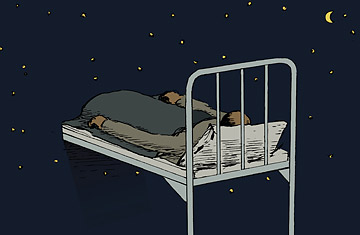
Chantal Sebire knows she's forcing people to make an agonizing decision, but agony is something she knows far too much about. The 52- year-old Dijon schoolteacher suffers from a rare disease that has left her disfigured by facial tumors, which will also damage her brain over time and eventually kill her. Her demand that French political leaders loosen laws against euthanasia has been rebuffed, so Sebire now awaits a judge's decision on whether existing legislation allows doctors to assist her in ending her pain-racked life. "I no longer accept this enduring pain, and this protruding eye that nothing can be done about," Sebire told RTL radio, referring to ravages the tumors are causing her. "I want to go out celebrating, surrounded by my children, friends, and doctors before I'm put to sleep definitively at dawn."
Whether the mother of three gets to do that in her French home is in the hands of a Dijon judge, who is set to hand down his decision Monday. Sebire's lawyers argue that current laws pertaining to terminal patients can be interpreted to allow active euthanasia. The political consequences of that ruling will be as grave as Sebire's vital stake in it. Members of France's center-right government have rejected Sebire's appeal in virtual unison, arguing that existing legislation, laid down in 2005, allows families and doctors of terminal patients to withhold life-sustaining treatment, but in no way permits active measures to provoke death. Sebire and her backers retort that preventing her from getting medical assistance to end her life swiftly and painlessly ensures months or years of additional torment from pain. Her death will come, they say, after a long coma that will reduce her to being nothing but an inanimate burden on her family.
Given both the heart-breaking nature of Sebire's condition and appeal, and the enormous ethical issues and medical precedents involved, Monday's decision is bound to rekindle the controversy and debate that has raged across France over the case in recent weeks. Earlier this month Sebire wrote a personal appeal to President Nicolas Sarkozy that he support her request for euthanasia. Her plea was motivated by a campaign speech Sarkozy made last year ahead of his election, in which he admitted "when I hear debates on euthanasia, I tell myself that while I respect the principles, the convictions, at the bottom of my heart I still say there are limits to the suffering that can be imposed on a human."
Apparently, however, there are also limits to how much personal conviction a president can translate into public policy. On Wednesday, Sarkozy responded to Sebire's appeal by offering to convene a panel of specialists to see if all possible means have been exhausted in treating her rare disease, known as esthesioneuroblastoma. On Thursday, Sebire declined that offer, explaining the advancing tumors have left her blind and otherwise disabled, and that movement beyond her home involved considerable effort and assistance.
Sebire's goal remains fixed: circumvent the 2005 law passed following a controversial mercy killing by a mother and doctor of a tetrapalegic, blind, and virtually shut-in patient who made his desire to die clear. In crafting that legislation, French lawmakers sought to draw a fine line between allowing terminal patients to die and active euthanasia, or mercy-killing, which is permissible under certain conditions in the Netherlands, Belgium and Switzerland.
French officials have made it clear a revision isn't being considered. French Prime Minster Franois Fillon this week said Sebire's plea "touches the limits of intimacy, of what society and the law can say." Likewise, Justice Minister Rachida Dati rejected reform of the existing law, explaining "in no case can death result from a project with which the medical corps is associated." Housing Minister Christine Boutin was even more pointed in rejecting Sebire's request, warning if France "gives the right to kill, we're heading towards a barbarian society."
Some government officials have suggested that while the judge will likely reject her case on Monday, it may be possible for her to be hospitalized and put into an artificial coma without being fed until she dies. That passive form of euthanasia, Sebire objected, was "neither dignified, humane, or respectful of me or my children." Should she lose, Sebire's lawyer says she'll either appeal, if she feels the strength to fight on, or give up her efforts to die in France on her own terms, and check into a Swiss facility specializing in assisted suicide. "It's hard for my children to imagine me going away there," Sebire explains, "but I can't take this anymore." If she wins, however, she may not have to.
